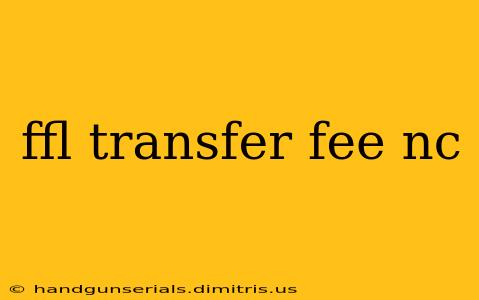Transferring firearms in North Carolina involves navigating specific regulations and potential fees. This guide clarifies the process and associated costs, helping you understand what to expect when transferring ownership of a firearm. We'll break down the fees, explain who charges them, and offer helpful tips to ensure a smooth transfer.
What are the Fees Involved in an FFL Transfer in NC?
The cost of an FFL (Federal Firearms Licensee) transfer in North Carolina isn't standardized. Several factors influence the final price, making it crucial to contact your chosen FFL dealer directly for a precise quote. However, you can expect to encounter fees stemming from the following:
1. The FFL Dealer's Transfer Fee:
This is the most significant cost. FFL dealers set their own transfer fees, which vary widely based on location, business overhead, and perceived demand. You might see fees ranging from $25 to $75 or even more, depending on the dealer. It's essential to inquire about their fee upfront before proceeding with the transfer.
2. Background Check Fees:
While not directly a fee charged by the FFL dealer, you should anticipate a background check fee as part of the overall transfer process. This fee is paid to the National Instant Criminal Background Check System (NICS) and is usually included in the dealer's overall transfer fee.
3. Additional Services:
Some FFL dealers may offer additional services, such as:
- Gunsmithing: If the firearm requires any repairs or adjustments before transfer, additional charges may apply.
- Storage: Some dealers may provide temporary storage for firearms, possibly incurring extra fees.
Factors Influencing Transfer Fees:
Several factors can influence the final transfer fee:
- Type of Firearm: The type of firearm being transferred might influence the dealer's fee. Certain firearms, such as NFA (National Firearms Act) items, will involve far more complex paperwork and regulations, leading to increased fees.
- Dealer's Location: FFL dealers in metropolitan areas tend to charge slightly higher fees due to increased overhead costs compared to rural areas.
- Demand: If there's high demand for firearm transfers at a particular shop, they may charge slightly more.
Tips for Minimizing Costs:
While you can't completely eliminate transfer fees, you can take steps to reduce costs:
- Shop Around: Contact multiple FFL dealers in your area to compare prices.
- Negotiate: Don't be afraid to negotiate the fee with the dealer, especially if you're making multiple transfers.
- Check for Sales/Promotions: Some dealers may occasionally offer discounts or promotions on transfer fees.
Avoiding Scams:
Be wary of unusually low transfer fees. While competitive pricing is expected, a price significantly lower than the average could indicate a potentially unscrupulous dealer. Verify the dealer's legitimacy through reviews and reputation.
Conclusion:
Understanding the potential fees associated with FFL transfers in North Carolina is critical for responsible firearm ownership. By being prepared and comparing prices, you can ensure a smooth and cost-effective transfer experience. Remember to always contact your chosen FFL dealer directly for an accurate quote before proceeding.

